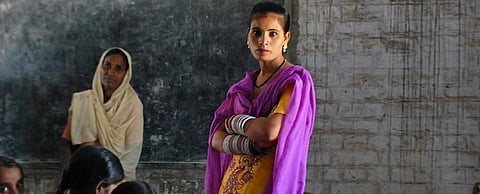

Food being distributed to scores of poor children and pregnant women in Anganwadi centres in Delhi since the novel coronavirus disease (COVID-19) lockdown is inadequate and the supply erratic, a group of activists wrote to the Delhi government recently.
It added that if proper nutrition was not supplied to them, the city could see a spike in malnutrition burden.
The Delhi Commission for Protection of Child Rights (DCPCR), too, issued a notice to the Women and Child Development department over supply under ICDS during lockdown.
More than 5.86 lakh people, including children up to six years of age and 1.10 lakh pregnant women, are beneficiaries in Delhi’s 10,897 anganwadi centres.
While children between three and six years usually get vegetable pulao, vegetable khichdi, dalia and sweet rice, younger children, pregnant women and lactating or nursing mothers are provided take-home rations.
The children from low socio-economic backgrounds are largely dependent upon the one-time meal that bridges the protein and calories deficiency among them.
Anganwadi centres in the city have been shut since March 6. The door-to-door supply by workers started towards the end of March. However, instead of nutrition kits, the beneficiaries were given a 650-gram packet of panjiri and a 250-gm packet of groundnuts.
Panjiri is a nutritional supplement made from whole-wheat flour fried in sugar and ghee.
“This falls short of the requirement for children in anganwadi centres. The quantity is highly insufficient and does not meet the nutritional norms as per Integrated Child Development Services (ICDS),” said Arvind Singh, advocacy and policy head, Matri Sudha, an NGO working in the field of malnutrition.
Moreover, in many locations, supply of these packets has been erratic and grossly inadequate.
For instance, in an Anganwadi centre in southeast Delhi, only 15 packets reached a worker last week against the requirement of 40 packets each of the two items. The worker then distributed them in a random fashion. The packets came once in 15 days — or sometimes once a week — the worker said.
“What good is half-kg panjiri and a small groundnut packet for 15 days? The kids would get hot cooked meals daily in Anganwadis,” said Deepa Bajaj, who works with anganwadis through her non-profit Child Survival India.
The ‘Campaign against Hunger and Malnutrition’, an alliance of civil society organisations including Matri Sudha and Child Survival India, sent a letter to Chief Minister Arvind Kejriwal flagging these issues on April 30.
It pointed out that there was uneven distribution of food supplies and that all beneficiaries were not getting all items. Anganwadi workers at the ground confirmed the same.
“Only 20 panjiri packets came so we could not distribute it to everybody. I have a list of least 40 beneficiaries. People who don’t get it question us,” said an Anganwadi worker.
The government should prepare a nutrition kit for children comprising soya chunks, semolina, wheat daliya, black gram and flattened rice or poha, which could be given once in 15 days, Anganwadi workers and activists mentioned in their recommendations.
“These children are highly vulnerable in terms of their nutritional standards and may be prone to various childhood diseases due to lack of sufficient diet,” stated the letter.
It also pointed out that pregnant women were finding it hard to get iron folic and calcium tablets that they got from ASHA workers.
The DCPCR highlighted the same in its notice saying the government should include nutritious food like daliya, horlicks, milk, cornflakes, semolina, etc in the kit. The commission has distributed half-litre milk packets to around 2,400 children so far.
“We are distributing it mainly to children who were affected in the riots that took place in northeast Delhi and in other areas like Bhati mines. The Delhi government, however, has a proper channel under ICDS and can reach a large number of beneficiaries,” said Ranjana Prasad, member, DCPCR.